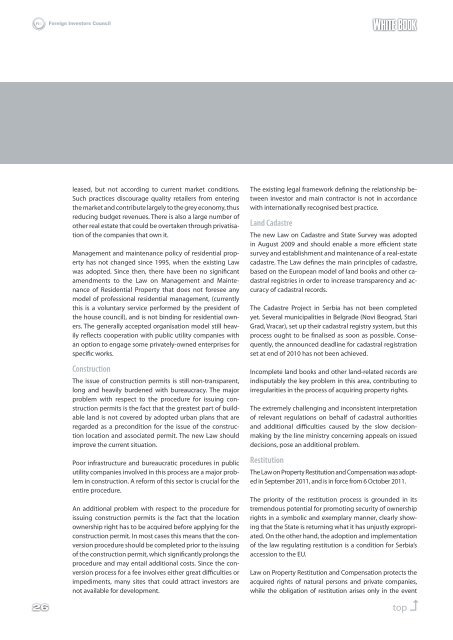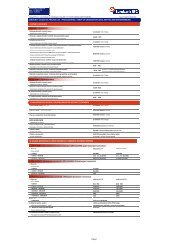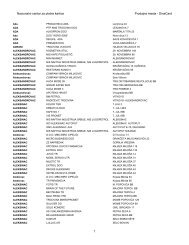Fic rEcommEndationS - Eurobank EFG
Fic rEcommEndationS - Eurobank EFG
Fic rEcommEndationS - Eurobank EFG
Create successful ePaper yourself
Turn your PDF publications into a flip-book with our unique Google optimized e-Paper software.
leased, but not according to current market conditions.<br />
Such practices discourage quality retailers from entering<br />
the market and contribute largely to the grey economy, thus<br />
reducing budget revenues. There is also a large number of<br />
other real estate that could be overtaken through privatisation<br />
of the companies that own it.<br />
Management and maintenance policy of residential property<br />
has not changed since 1995, when the existing Law<br />
was adopted. Since then, there have been no significant<br />
amendments to the Law on Management and Maintenance<br />
of Residential Property that does not foresee any<br />
model of professional residential management, (currently<br />
this is a voluntary service performed by the president of<br />
the house council), and is not binding for residential owners.<br />
The generally accepted organisation model still heavily<br />
reflects cooperation with public utility companies with<br />
an option to engage some privately-owned enterprises for<br />
specific works.<br />
construction<br />
The issue of construction permits is still non-transparent,<br />
long and heavily burdened with bureaucracy. The major<br />
problem with respect to the procedure for issuing construction<br />
permits is the fact that the greatest part of buildable<br />
land is not covered by adopted urban plans that are<br />
regarded as a precondition for the issue of the construction<br />
location and associated permit. The new Law should<br />
improve the current situation.<br />
Poor infrastructure and bureaucratic procedures in public<br />
utility companies involved in this process are a major problem<br />
in construction. A reform of this sector is crucial for the<br />
entire procedure.<br />
An additional problem with respect to the procedure for<br />
issuing construction permits is the fact that the location<br />
ownership right has to be acquired before applying for the<br />
construction permit. In most cases this means that the conversion<br />
procedure should be completed prior to the issuing<br />
of the construction permit, which significantly prolongs the<br />
procedure and may entail additional costs. Since the conversion<br />
process for a fee involves either great difficulties or<br />
impediments, many sites that could attract investors are<br />
not available for development.<br />
The existing legal framework defining the relationship between<br />
investor and main contractor is not in accordance<br />
with internationally recognised best practice.<br />
Land cadastre<br />
The new Law on Cadastre and State Survey was adopted<br />
in August 2009 and should enable a more efficient state<br />
survey and establishment and maintenance of a real-estate<br />
cadastre. The Law defines the main principles of cadastre,<br />
based on the European model of land books and other cadastral<br />
registries in order to increase transparency and accuracy<br />
of cadastral records.<br />
The Cadastre Project in Serbia has not been completed<br />
yet. Several municipalities in Belgrade (Novi Beograd, Stari<br />
Grad, Vracar), set up their cadastral registry system, but this<br />
process ought to be finalised as soon as possible. Consequently,<br />
the announced deadline for cadastral registration<br />
set at end of 2010 has not been achieved.<br />
Incomplete land books and other land-related records are<br />
indisputably the key problem in this area, contributing to<br />
irregularities in the process of acquiring property rights.<br />
The extremely challenging and inconsistent interpretation<br />
of relevant regulations on behalf of cadastral authorities<br />
and additional difficulties caused by the slow decisionmaking<br />
by the line ministry concerning appeals on issued<br />
decisions, pose an additional problem.<br />
restitution<br />
The Law on Property Restitution and Compensation was adopted<br />
in September 2011, and is in force from 6 October 2011.<br />
The priority of the restitution process is grounded in its<br />
tremendous potential for promoting security of ownership<br />
rights in a symbolic and exemplary manner, clearly showing<br />
that the State is returning what it has unjustly expropriated.<br />
On the other hand, the adoption and implementation<br />
of the law regulating restitution is a condition for Serbia’s<br />
accession to the EU.<br />
Law on Property Restitution and Compensation protects the<br />
acquired rights of natural persons and private companies,<br />
while the obligation of restitution arises only in the event<br />
26 top �




